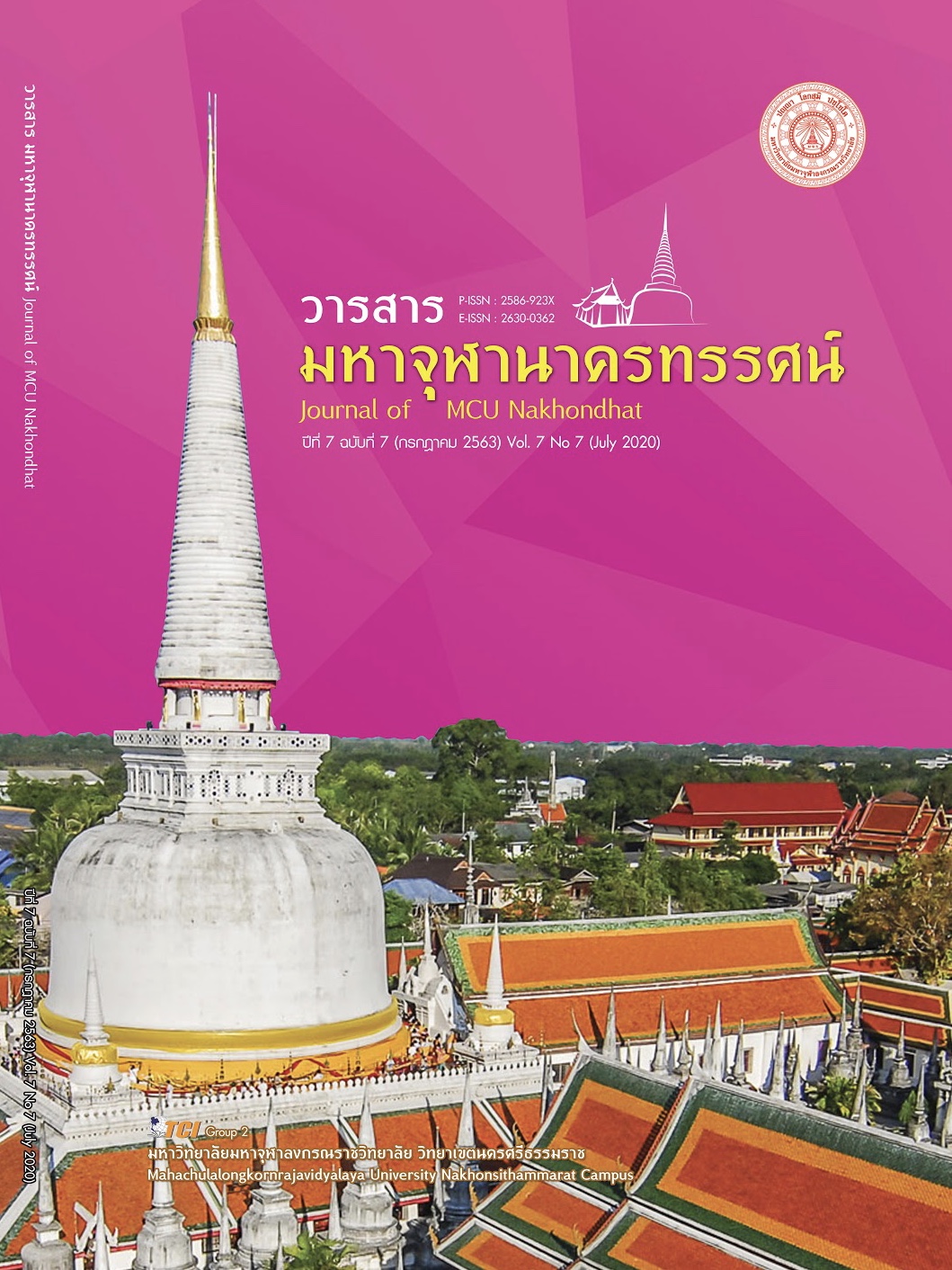EQUALITY OF HUMAN RIGHTS AND THE RIGHTS TO RECEIVE THE COMPENSATION OF CRIMINAL VICTIMS
Main Article Content
Abstract
The objectives of the study were to reflect the usage in equality of human rights and the rights to receive the compensation of criminal victims in the duties of government officials. The analysis result found that the human rights are fundamental rights inherent to all human beings, whatever nationality, skin color, sex, age, language, religion, status of body or health, religious beliefs, and other opinions, but there was discrimination in compensation for damage to the injured and crime victims. According to the Act Compensation for the injured and compensation and expenses to criminal defendants 2001 and the second amendment in 2016, this was to create the measures to protect the rights and freedoms of individuals, and help the injured and crime victims appropriately and equally. Therefore, government officials in Ministry of Justice aim to reduce inequality in society and comply with equality. The government pays for the compensation to the injured who are the right person, but there are some people who cannot reach this condition. So, it’s a topic about the differences in the equality according to human principles, for instance, some people who are broken up, lack of educational opportunities, lack of legal knowledge and legal rights, may be a victim of exploitation, deception, or rights violation of others who are in superiority. Thus, leading to equality entirely must have a principle that supports the disadvantaged to get a chance and receive the assistance.
Article Details
References
กรมคุ้มครองสิทธิและเสรีภาพ กระทรวงยุติธรรมและศูนย์วิจัยและพัฒนาอาชญาวิทยาและกระบวนการยุติธรรม. (2552). คู่มือเพื่อดำเนินงานแผนสิทธิมนุษยชนแห่งชาติ ฉบับที่ 2 พ.ศ.2552 – 2556) สำหรับองค์กรเครือข่ายสิทธิมนุษยชน. กรุงเทพมหานคร: มหาวิทยาลัยธรรมศาสตร์.
ณรงค์ ใจหาญ. (2552). หลักกฎหมายวิธีพิจารณาความอาญา. (พิมพ์ครั้งที่ 10). กรุงเทพมหานคร: วิญญูชน.
ปุระชัย เปี่ยมสมบูรณ์. (2535). เหยื่ออาชญากรรม. ใน รายงานการวิจัย. สถาบันบัณฑิตพัฒนบริหารศาสตร์.
ผจงจิตต์ อธิคมนันทะ. (2525). สังคมวิทยาว่าด้วยอาชญากรรมและการลงโทษ. กรุงเทพมหานคร: มหาวิทยาลัยรามคำแหง.
พระราชบัญญัติค่าตอบแทนผู้เสียหายและค่าทดแทนและค่าใช้จ่ายแก่จำเลยในคดีอาญา (ฉบับที่ 2). (2559). ราชกิจจานุเบกษา เล่ม133 ตอนที่ 74 ก หน้า 1 (22 สิงหาคม 2559).
พระราชบัญญัติประกอบรัฐธรรมนูญว่าด้วยคณะกรรมการสิทธิมนุษยชนแห่งชาติ. (2560). ราชกิจจานุเบกษา เล่ม134 ตอนที่ 123 ก หน้า 2 (12 ธันวาคม 2560).
มานิตย์ จุมปา. (2546). คำอธิบายรัฐธรรมนูญแห่งราชอาณาจักรไทย พุทธศักราช 2540. (พิมพ์ครั้งที่ 5 แก้ไขเพิ่มเติม). กรุงเทพมหานคร: นิติธรรม.
รัฐธรรมนูญแห่งราชอาณาจักรไทย. (2550). ราชกิจจานุเบกษา เล่ม 124 ตอนที่ 47 ก หน้า 4 (24 สิงหาคม 2550).
. (2560). ราชกิจจานุเบกษา เล่ม 134 ตอนที่ 40 ก หน้า 8 (6 เมษายน 2560).
วันชัย ศรีนวลนัด. (2552). ความสำคัญของสิทธิมนุษยชนกับนักกฎหมาย. กรุงเทพมหานคร: สถาบันพระปกเกล้า.
วีระวุธ ชัยชนะมงคล. (2531). ระบบควบคุมกระบวนการสอบสวนคดีอาญา: ทัศนะของพนักงานสอบสวน ศึกษาเฉพาะกรณีกอง
บังคับการตำรวจนครบาลพระนครเหนือ กองบัญชาการตำรวจนครบาล. ใน วิทยานิพนธ์สังคมสงเคราะห์ศาสตรมหาบัณฑิต สาขาสังคมสงเคราะห์ศาสตร์. มหาวิทยาลัยธรรมศาสตร์.
วีระศักดิ์ แสงสารพันธ์. (2544). ผู้เสียหายในคดีอาญา การศึกษาสิทธิและการคุ้มครองสิทธิของผู้เสียหายในกระบวนการยุติธรรมทางอาญาของไทย. ใน วิทยานิพนธ์นิติศาสตรมหาบัณฑิต สาขานิติศาสตร์. มหาวิทยาลัยธรรมศาสตร์.
อัญชลี ฉายสุวรรณ. (2534). การทดแทนผู้เสียหายในคดีอาญาหรือเหยื่ออาชญากรรมโดยรัฐ. ใน วิทยานิพนธ์นิติศาสตรมหาบัณฑิต สาขาวิชานิติศาสตร์. จุฬาลงกรณ์มหาวิทยาลัย.
Henry, C. (1979). Black, Black’s law Dictionary. Boston: West Publishing.
Siegel, L. (2000). Criminology. University of Michigan: Wadsworth/Thomson Learning.


